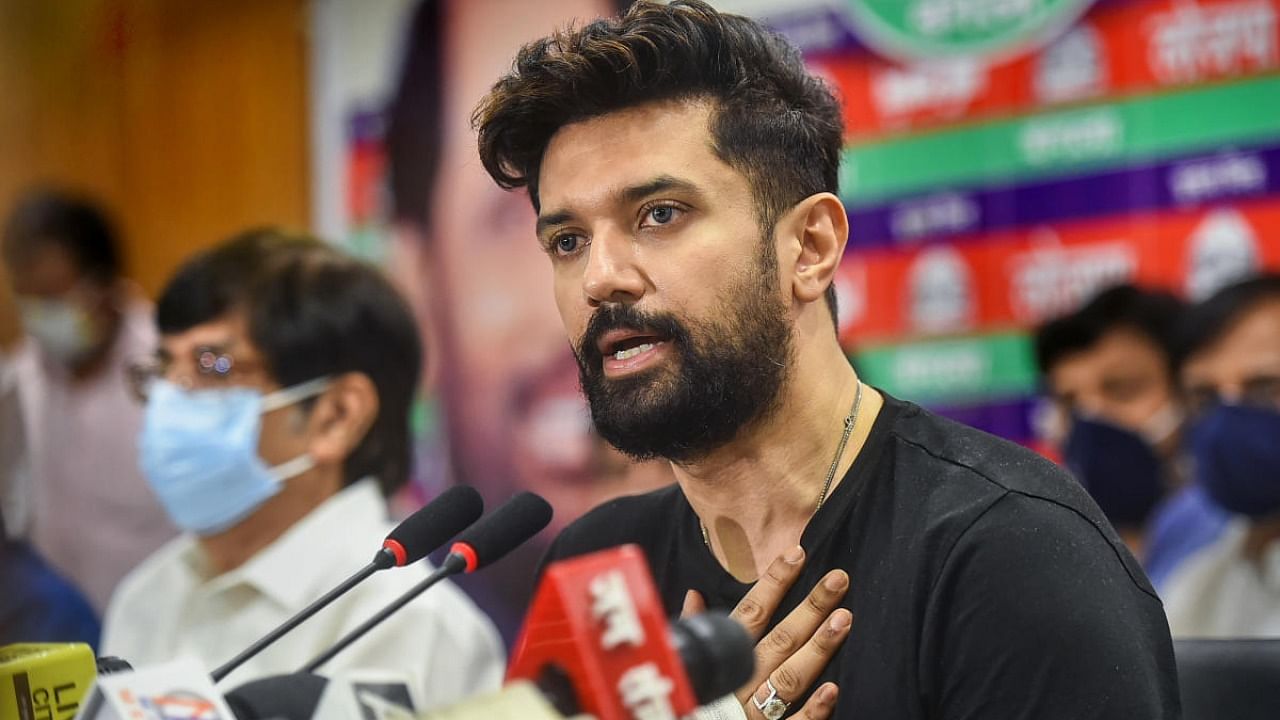
When out of power, politicians are a tribe willing to tolerate much adversity, even insult and unsolicited advice.
Lok Sabha member Chirag Paswan has had some of both heaped upon him ever since his two uncles outfoxed him. One of the uncles is related to him by blood, Pashupati Kumar Paras; the other his late father's brother-in-arms from the socialist movement, Nitish Kumar.
Beseeching the man he considered his guardian angel, Prime Minister Narendra Modi, has not helped. As he flits frenetically between Delhi, Patna and Ahmedabad for succour, a flailing Chirag Paswan is losing precious time.
Before he hurtles to irredeemable political obscurity, Chirag Paswan might do well to learn from the recent tribulations of another of his father's old comrades, Sharad Yadav.
He might also find helpful the experiences of Dalit leaders such as BR Ambedkar and Kanshi Ram, both of whom launched their independent parties instead of becoming appendages of parties run by upper-caste elites.
A lesson from 7, Tughlaq Road
On the evening of July 25, 2017, in the living room of his Lutyens Delhi bungalow, Sharad Yadav had sat watching news channels beam visuals of a pleased Nitish Kumar walking out of the Patna Raj Bhavan.
Nitish Kumar had severed his party's alliance with the Rashtriya Janata Dal (RJD) and walked out of Bihar's 'grand alliance' - comprising Kumar's Janata Dal (United), RJD and Congress - that had worsted the BJP in 2015 Bihar Assembly polls.
Sharad Yadav was a leading light of the JD(U) but now uncertain of his future. Some in his party implored him to take a principled stand on the issue, protest Kumar's truck with the BJP as a betrayal of the 2015 Assembly poll mandate, quit the JD(U), and launch an anti-BJP front in a blaze of rebellious ideological glory.
But Sharad Yadav was uneasy quitting the JD(U) to sup with friend-turned-foe RJD's Lalu Prasad Yadav, someone he had challenged and opposed for over two decades.
There were also voices closer home that told him to exercise caution, even patience. The PM might relent and include him in the Union cabinet, they argued. At stake also was his Rajya Sabha seat.
But this was inconsistent with the vociferous anti-BJP campaign Sharad Yadav had led in and outside Parliament since 2014. Barely a month before these events, in June 2017, the socialist leader had accompanied Congress's Rahul Gandhi to Mandsaur in Madhya Pradesh to protest the killing of five farmers by the police in the BJP ruled state.
Sharad Yadav believed Arun Jaitley, his close friend from the days of the Emergency four decades back, will help get him into the Union cabinet. However, it was not to be, and Sharad Yadav had no alternative but to align with the RJD in Bihar and seek the help of the Congress party in launching the 'Sanjhi Virasat' platform.
Opposition leaders rallied behind him, but his associates believe to this day that Sharad Yadav lost the moment that could have propelled him to be a much more influential leader in the Opposition's fight against the BJP.
Young Chirag Paswan faces a similar predicament as he plans to launch his 'Aashirwad Yatra' on the birth anniversary of his father on July 5. His options are identical to the ones that confronted Sharad Yadav four years back.
Chirag Paswan needs to decide soon if he will wait for the PM to reconstitute the union council of ministers or align with the RJD and Communist Party of India (Marxist-Leninist) in Bihar against the BJP-JD(U) alliance. RJD's Tejashwi Yadav has moved quickly in inviting Chirag Paswan to join him.
Lessons from another Ram
As Chirag Paswan waits for his Lord Ram, or Modi, to respond to his pleas, he might as well read up on the writings of Kanshi Ram, the founder of the Bahujan Samaj Party and author of the eponymous treatise on Dalit politics, Chamcha Yug (The Era of Stooges).
Kanshi Ram published the book on the eve of the 50th anniversary of the Poona Pact of 1932. He argued Dalits need their independent politics to fight against inequality and discrimination. Else they will remain stooges in political parties run by the upper caste elite. It is a sentiment that had BR Ambedkar found the Republican Party of India, Kanshi Ram shape the BSP, and Chirag Paswan's father, Ram Vilas Paswan, found the Lok Janshakti Party in 2000.
Will Chirag Paswan find the courage to risk losing the comfort of his Lutyens bungalow to fight for his place in the pantheon of Dalit leaders who carved out independent politics? Or will he opt to be an appendage of an upper-caste run party? That decision could determine the 38-year-old leader's longevity in Indian politics.